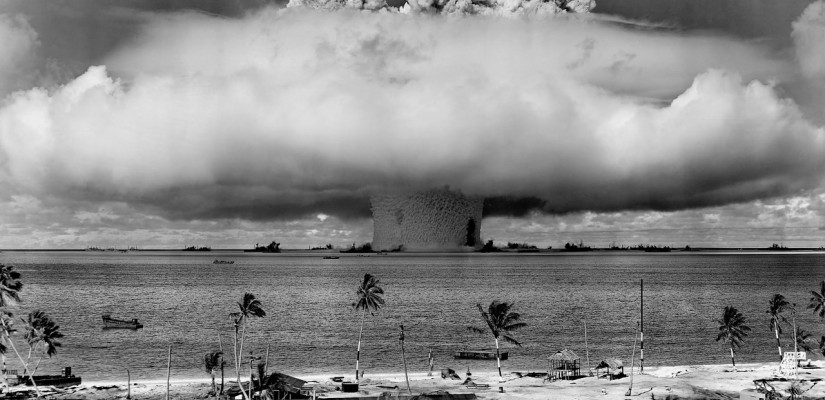On October 20th of 2018, USA President Donald Trump announced that he plans to withdraw the United States from a Cold War-era nuclear weapons pact that has been referred to as a pillar of Europe’s security architecture for over 30 years. This consequential move by the Trump Administration is part of a greater strategy that if executed incorrectly, could bring about renewed nuclear arms proliferation between the United States and Russia with Europe bearing consequences. This crisis involves many of the world’s most powerful political players including the United States, Russia, China, Germany, France, and the United Kingdom.
Although no official steps have been taken, President Trump has declared his intent to withdraw from the Intermediate-Range Nuclear Forces (INF) Treaty. This treaty, originally signed in 1987 by USA President Ronald Reagan and USSR Chairman Mikhail Gorbachev, deescalated the threat of nuclear confrontation with both nations agreeing to eliminate their short-range and intermediate-range nuclear conventional missiles from Europe. Despite the initial success of this treaty in diminishing threats of nuclear confrontation during the Cold War, new developments have generated doubts about the future effectiveness of this agreement.

Both the United States and Russia have previously accused each other of violations to the INF Treaty. President Trump’s threat to withdraw follows accusations previously made in 2014 by then-President Obama, claiming Russia’s development of a land-based cruise missile, the Novator 9M729, is not compliant with the treaty. Russia has repeatedly denied these allegations and in turn has accused the USA of violating the treaty with their deployment of the Mark 41 Vertical Launching System to Romania and Poland.
In response to President Trump’s anticipated withdrawal, Russian Deputy Foreign Minister, Sergei Ryabkov, has threatened “military-technical” retaliation. These threats of retaliation refer to the potential reinstallation of ground-based nuclear arms in Europe, which would be the anticipated response from both actors should this agreement dissolve. Deputy Foreign Minister Ryabkov has also explained that the INF Treaty is important for security in the nuclear weapons sphere and for maintaining strategic stability. Moreover, former Chairman Gorbachev himself condemned the expected USA withdrawal from the treaty. Highlighting NATO’s divided opinions on the issue, German Foreign Minister Heiko Maas and French President Emmanuel Macron have urged President Trump to reconsider his decision, while Poland has backed President Trump’s move and UK Defense Secretary Gavin Williamson has stated that the UK stands “absolutely resolute” with the decision.
Although much of the attention is focused on the potential for a nuclear battleground in Europe, the most dynamic factor in this debate is the role played by China as it is not a member of the INF Treaty. China has therefore developed its own arsenal of systems that would be considered as a violation. China’s collection of intermediate-range missiles includes the recently developed DF-26, which is capable of reaching American military installations in Japan, South Korea, and Guam. Reportedly, one of President Trump’s largest concerns with the INF Treaty is that China has been allowed to develop a network of nuclear missile technology while the USA is limited in its ability to counter such threats. Furthermore, President Trump has stated his intention to develop land-based nuclear missiles unless Russian and China halt their development.

After USA National Security Advisor John Bolton’s meeting with Russia President Vladimir Putin on October 23rd of 2018, it was made clear that the U.S. is planning to move forward with its withdrawal from the INF Treaty. Notably, Security Advisor Bolton has been opposed to the treaty since 2011, citing the need to counter China’s growing arsenal. Given Bolton’s clear opposition to the treaty and role as security advisor, it is unsurprising that President Trump wants to abandon this treaty.
Many European nations are justifiably uneasy with the potential breakdown of the INF Treaty, understanding that a likely consequence is the buildup of nuclear missiles on the continent and the reliance on mutually assured destruction to maintain peace. President Putin plans to respond in kind to any actions taken by the USA in Europe, meaning he would likely place intermediate-range nuclear-capable missiles in Kaliningrad, which is a strategic Russian enclave in Europe. Furthermore, President Putin has said that he would be forced to target European countries that agree to host USA missiles. The risk of becoming a target of a nuclear counterstrike will surely cause NATO members to hesitate before agreeing to host American missiles. It is indeed incredibly unfortunate that Europe would bear the consequence of such a conflict between Russia and the United States.
The inability of the INF Treaty to restrict China along with Russia’s alleged violations puts the USA in a complex position. A new treaty that includes China and potentially other nuclear powers is surely needed. Furthermore, this Cold War-era treaty is no longer relevant the same way it was before considering present capabilities. The treaty does not restrict air or naval based nuclear threats. President Trump’s withdrawal from the INF could be part of a plan to pressure Russia and China into a new treaty. However, failure could lead to an arms proliferation in Europe and the South China Sea. Convincing China to give up part of their nuclear arsenal will not be easy given that previous attempts to include China in the INF Treaty have been unsuccessful. Also, convincing China to limit its nuclear arsenal would likely entail reciprocal action from the USA, such as restricting its air or naval-based nuclear weapons. Nevertheless, President Putin’s planned meeting with President Trump in Paris on November 11th, 2018 shows that Russia is willing to negotiate on this issue.

A significant weight hanging in the balance is the fate of the Strategic Arms Reductions Treaty (START) which is set to expire in 2021. This treaty limits number of strategic nuclear warheads deployed to 1,550. The dispute over the INF Treaty may prevent the extension of START and potentially result in a further buildup of nuclear arms.
To describe a subsequent treaty withdrawal as “risky” would be an understatement. While a new treaty involving China is clearly needed, a USA withdrawal from the current treaty is a dangerous strategy that provokes a potential arms proliferation and further potential for conflict. The option of nuclear deterrence through mutually assured destruction is furthermore unproductive as it is far too precarious. Furthermore, President Trump’s continuing trend of withdrawing from treaties is distracting from the underlying threats of Russian and Chinese nuclear augmentation. Lastly, the USA already possesses an immense amount of nuclear deterrence with its air and naval capabilities, therefore it is hazardous and unnecessary to initiate an arms proliferation for ground-based nuclear weapons without first exhausting all diplomatic efforts.
